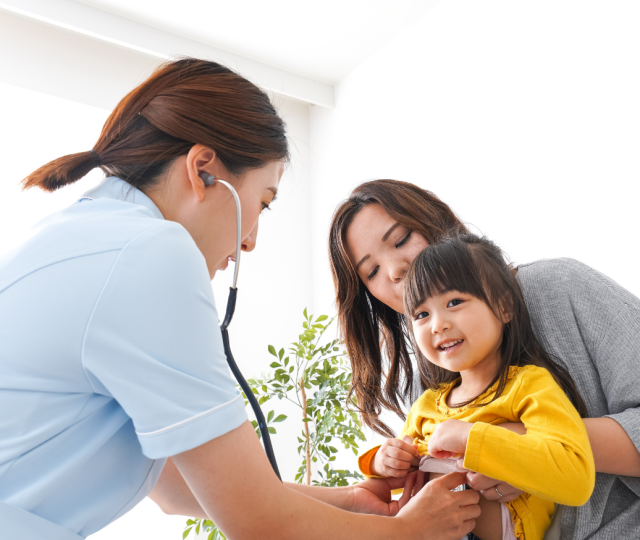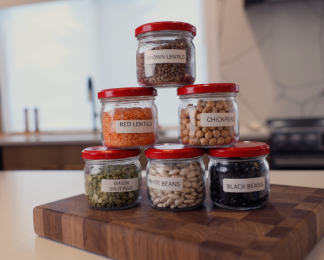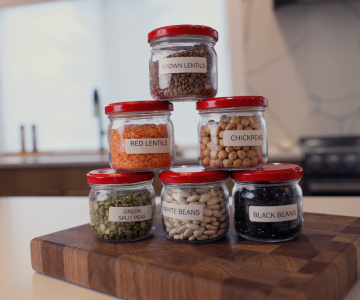Children and youth
Access health information for children & youth on dental health, hearing health, immunization, mental health, nutrition, injury prevention and suicide prevention.
Access health information for children and youth on dental health, hearing health, immunization, mental health and substance use, nutrition and other topics.

Access health information for children & youth on dental health, hearing health, immunization, mental health, nutrition, injury prevention and suicide prevention.
Maintaining a daily routine, cleaning your child’s teeth and gums twice a day, and seeing an oral health professional for regular preventive visits, will support your child’s overall health and wellness.
Help your child brush their teeth until their fine motor skills develope, around the age of eight years.
Healthy snacking is important for the healthy development and growth of your child. Your child’s teeth can benefit from making choices that reduce the risk for tooth decay:
Offer three meals and two to three snacks each day at regular times. Plan meals and snacks about two to three hours apart. When children eat at regular times they are more likely to be ready to eat.
Vary the daily snack choices with foods such as vegetables, fruits and dairy products.
Eat sticky foods with meals, instead of by themselves as a snack
Limit milk and juice (100% unsweetened) to regularly scheduled meal and snack times.
Encourage drinking water for thirst between meals.
Protecting teeth is important for all ages.
Despite our best efforts, accidents can happen. Call a dentist immediately if a tooth is chipped, broken, or knocked-out.
The use of tobacco products can affect the health of the mouth, teeth and gums.
Smoking can increase gum disease, teeth staining, and bad breath.
Sense of smell and taste is lessened.
Spit tobacco and smokeless tobacco can cause oral cancers of the lips, cheeks, tongue, throat, voice box and esophagus.
Oral cancer risk increases with the number of cigarettes smoked each day and the number of years as a smoker.
Oral hygiene is very important while the piercing site is healing. The mouth is naturally filled with bacteria and the oral environment is moist so infection can set in if the site is not cared for. It is important to ensure that the piercer uses sterile techniques to limit infection. The dangers to piercing include excessive swelling of the tongue that can interfere with swallowing and the ability to eat as well as a risk of nerve damage to the tongue/lip that could cause permanent numbness and/or loss of taste. Depending on the location, the jewellery can chip/crack teeth, interfere with speech, cause shrinkage of the gums, and increase sensitivity to hot/cold.
See a dentist or doctor if there are any signs of prolonged healing (10-14 days).
The Cleft Lip and Palate Clinic is a service to help families coordinate the surgeries, assessments, therapies, and monitoring that their child may require. The clinic runs in the spring and fall of each year at the Interior Health Community Health and Services Centre in Kelowna.
Families are called to visit with our full cleft lip and palate team for the first time when their baby is approximately 18-24 months of age. The coordinator of the service will get in touch with the family at the time the referral is received to answer questions and provide information.
This service is available for children and youth from birth to age 19 who live in the Interior region of British Columbia. This service is covered by the Medical Services Plan.
A collaboration of health care professionals, the team consists of plastic surgeons, orthodontists, pediatricians, ear, nose and throat doctors (ENTs), dental hygienists, pediatric dentists, speech-language pathologists, audiologists, and oral & maxillofacial surgeons.
A doctor, midwife, nurse practitioner, public health nurse or member of the Kelowna Cleft Lip & Palate Team can submit the Cleft Lip and Palate Referral Form if they have internal Interior Health system access. Otherwise they may complete the e-fillable referral form, and mail or fax it to the Kelowna Community Health and Services Centre. Physicians/nurses/midwives can also call the Clinic Desk directly at 250 469 7070, ext. 12074 to ask questions about services or make referrals over the phone. If you are transferring from a Cleft Palate Clinic in a different city or province, any member of that Clinic team may refer.
Contact Janice Bennett, Coordinator of the Cleft Lip and Palate Clinic, ext.12122
Available Mondays from 8:00 a.m. - 4:00 p.m.
Several families attend each clinic, held in April and October. You should expect to spend the full morning at the clinic. Each family will see each professional. Families, along with their family doctor or nurse practitioner, will also receive a printed summary of the recommendations following the clinic.
Please note: This Kelowna-based team works in partnership with the health care providers already caring for your child. The team does not provide treatment at the clinic, and does not replace the professionals you are seeing for current medical treatment.
By following Canada's Food Guide, children and teens can get the nutrients they need to grow and thrive. Parents sometimes worry about their child’s eating habits. Perhaps they only want to eat their favorite food. Or they refuse to eat certain types of vegetables no matter how they are presented. One way to help children eat well and develop a positive relationship with food is to respect the different roles adults and children have in feeding and eating.
In time, children will learn to eat as little or as much as they want at set meal and snack times. This will encourage them to trust their internal hunger cues. Plus, when parents are in charge of ‘when to eat’ it prevents grazing between eating times and helps children come to the table hungry.
It is never too early to have your child's hearing tested. Early detection of hearing loss, followed by early and comprehensive intervention, makes a significant difference to the quality of life for the individual, their family and the community.
Allied health audiology provides hearing services to children from newborn to 19 years, as well as special needs adults. Hearing services include; newborn hearing screening, diagnostic hearing evaluations, and hearing aid and assistive listening device fittings.
Find hearing services available near you.
Does your child have:
Speech or language difficulties?
Trouble locating sounds?
Trouble understanding speech?
Trouble understanding directions?
Better understanding when he/she can see your face?
A history of serious illness?
A history of frequent ear infections?
Frequent allergies?
Learning difficulties?
A close relative with a permanent hearing loss?
If you answered "yes" to any of the questions above, your child should have a hearing test. To have your child's hearing tested, download the Request for Audiology Services form and mail to your local health centre or contact your local health center audiology clinic directly.
We welcome referrals from health care professionals, parents/caregivers, schools, and other interested professionals.
Quick facts
One in 10 Canadians has a speech, language, or hearing disorder which hinders their ability to communicate.
Early detection and rehabilitation of hearing disorders can often prevent communication difficulties in school, on the job, and in social situations.
Audiologists are essential members of the health care team who are trained to evaluate a full range of hearing disorders
Resources
Understand more about how we hear
Find information about hearing aids
As children get older, the protection from childhood vaccines can wear off. Children are also at risk of new disease as they enter their pre-teen years. That’s why they need vaccinations too.
We can all reduce injuries by taking responsibility for our safety and the safety of others.
The BC Injury Research and Prevention Unit suggests learning to take safe risks by:
Using proper safety equipment, such as helmets and seat belts.
Educating ourselves and children about safety aspects of activities, such as poison prevention and water safety for swimmers.
Connecting with injury prevention groups in our communities.
Reducing the opportunity for injuries to occur through safe playgrounds, education about safe behaviours, supervised physical education and sports activities, young driver education, use of bike paths, and training for teens as new employees at work sites.
Minimizing harm in injury situations by proper use of helmets, seat belts, airbags, sunscreen, community first aid training, accessible and available emergency response, MedicAlert bracelets, and knowledge of universal (standard) precautions.
Injuries can also be intentional, as a result of violence and suicide.
Good mental health can help children and youth manage the ups and downs of life. Mental health is more than the absence of mental illness. Good mental health can increase happiness and help children and youth manage the normal “ups and downs” of life.
The Canadian Mental Health Association estimates that 10 to 20 per cent of children and teens in Canada have mental health issues. Up to 70 per cent of mental health problems start in the childhood and teen years. If left unchecked, problems can continue, affecting school and life success.
Child and youth mental health services are offered throughout British Columbia by the Ministry for Children and Family Development (MCFD). This includes a wide range of community-based mental health services to assess, treat and support children, youth and their families. Although MCFD provides the majority of child and youth services, IH and local partner agencies also provide the following services for youth under the age of 19:
See your family doctor or nurse practitioner, or contact the local Child and Youth Mental Health Offices of MCFD.
Foundry BC is another organization that offers young people ages 12-24 health and wellness resources, services and support. Integrated service centres in Kelowna & Penticton can be accessed through foundrybc.ca. For all other IH communities services can be accessed through foundrybc.ca/virtual.
A strong foundation in childhood can lead to a healthy, happy and productive life. Good mental health contributes to better relationships and home, work and life success.
Anxiety is the most common mental health challenge faced by children and teens. Solving problems rather than avoiding them is a helpful way to prevent childhood anxiety. Other ways to develop positive mental health include:
A positive relationship with at least one adult
Good relationships with peers
Success in learning at school
A sense of community and of a greater purpose in life
Children and youth need stability, safety and supportive adults in their lives to encourage their healthy development. Practice positive mental health and well-being for the whole family.
School is an important place for shaping children’s self-esteem, self-confidence and sense of control over their lives. Children and teens spend more than six hours daily and over 180 days a year in school. Schools can provide key activities and whole school approaches that support Positive Mental Health.
Find out if your child’s school offers social and emotional learning programs such as FRIENDS for Life or Roots of Empathy. Social and emotional learning (SEL) is the way children become aware of, manage and appropriately express their emotions; make and meet personal goals; develop positive relationships; make good decisions; and become good citizens.
Speech Language Pathology services for school aged children are offered through the school system. Families of school aged children or children who are about to enter kindergarten should contact the school district for service.
The best thing you can do is model a tobacco and vape-free lifestyle. Ensure that the spaces where your children live, learn and play are free of tobacco smoke and vapour. Create a smoke and vape-free home and vehicle, and make sure that your child’s other caregivers do the same.
Support smoke and vape-free schools, playgrounds and playing fields in your community.
If you use tobacco, consider quitting. If it’s not time for you to quit yet, talk with your child about your experience with smoking. Parents who smoke can still make a difference by talking about how difficult it is to quit and that you hope they will not start.
Suicide continues to be the second leading cause of death for young people in British Columbia following unintentional injuries. Furthermore, for every young person who dies by suicide, many more attempt or consider suicide.
If you are in a crisis or know someone who is having thoughts of suicide call 1-800-SUICIDE (784-2433). This service is available 24 hours a day, seven days a week and in up to 140 languages. It's operated in partnership with Crisis Line Association of BC.
Communities together with youth and suicide survivors are working throughout the Interior region and province to:


/stories/how-cook-your-way-healthy-heart-plant-based-proteins


Shari, Maxwell, and Andrew work together across many different teams to provide sustainable, safe, and high quality facilities to patients and staff.
/stories/we-are-ih-staff-who-work-together-patient-comfort-safety


IH offers a range of services to help those who may have mental health, substance use or housing needs.
/stories/sharing-warmth-and-hope-ih-health-services-help-communities


Jayme helps ensure lived experiences are not just welcomed but embedded across Mental Health and Substance Use services at IH.
/stories/we-are-ih-coordinator-centres-peer-voices-care


As temperatures drop, it’s important to be aware of the health risks of cold. Here's what you can do to ensure you remain safe and healthy.
/stories/how-protect-yourself-and-others-when-temperature-drops


Heart disease is the number one killer of women worldwide and the leading cause of premature death in Canada. One in 3 women will be affected by heart disease.
/stories/how-women-experience-heart-disease-differently-men
Receive news, alerts, public service announcements and articles right to your inbox.
